The enzymatic RNA manufacturing market is projected to grow from USD 1,357.4 million in 2025 to approximately USD 3,184.1 million by 2035, recording an absolute increase of USD 1,826.7 million over the forecast period. This translates into a total growth of 134.6%, with the market forecast to expand at a compound annual growth rate (CAGR) of 8.9% between 2025 and 2035.
The overall market size is expected to grow by 2.3X during the same period, supported by increasing demand for advanced RNA therapeutics, growing prevalence of genetic disorders, and rising adoption of enzymatic synthesis technologies across the global pharmaceutical and biotechnology sectors.
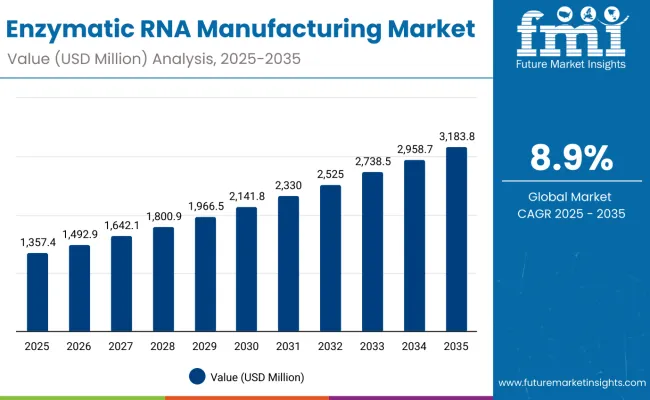
Enzymatic RNA Manufacturing Market Key Takeaways
| Metric | Value |
|---|---|
| Estimated Value in (2025E) | USD 1,357.4 million |
| Forecast Value in (2035F) | USD 3,184.1 million |
| Forecast CAGR (2025 to 2035) | 8.9% |
Between 2025 and 2030, the enzymatic RNA manufacturing market is projected to expand from USD 1,357.4 million to USD 2,079.0 million, resulting in a value increase of USD 721.6 million, which represents 39.5% of the total forecast growth for the decade. This phase of development will be shaped by increasing RNA therapeutics development, rising demand for gene therapy applications, and growing utilization in personalized medicine and vaccine development applications. Pharmaceutical manufacturers and biotechnology companies are expanding their RNA synthesis capabilities to address the growing preference for enzymatic manufacturing solutions in therapeutic RNA production systems.
From 2030 to 2035, the market is forecast to grow from USD 2,079.0 million to USD 3,184.1 million, adding another USD 1,105.1 million, which constitutes 60.5% of the overall ten-year expansion. This period is expected to be characterized by the expansion of advanced RNA synthesis technologies, the integration of AI-powered process optimization systems for premium enzymatic RNA products, and the development of enhanced scalability features for commercial applications. The growing emphasis on RNA-based therapeutics and vaccine development will drive demand for sophisticated enzymatic manufacturing solutions with enhanced efficiency capabilities and improved production reliability.
Between 2020 and 2024, the enzymatic RNA manufacturing market experienced steady growth at a CAGR of 7.3%, driven by increasing RNA therapeutics awareness and growing recognition of enzymatic synthesis systems' superior production capabilities across pharmaceutical and biotechnology applications. The market developed as manufacturers recognized the potential for enzymatic RNA manufacturing to enhance product quality while meeting modern pharmaceutical requirements for purity, scalability, and cost-effectiveness. Technological advancement in enzyme optimization and synthesis protocols began emphasizing the critical importance of maintaining production consistency while improving yield and reducing manufacturing complexity.
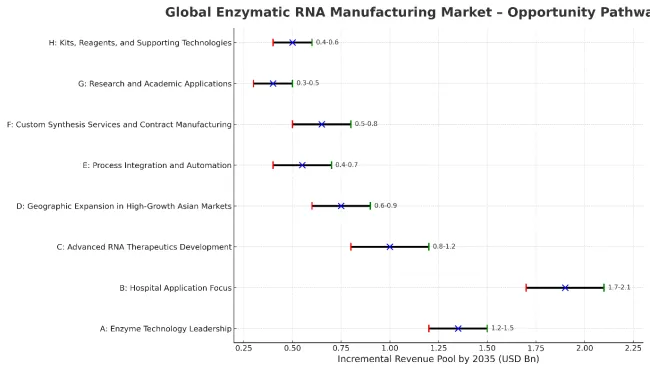
The enzymatic RNA manufacturing market represents a rapidly expanding biotechnology opportunity at the intersection of pharmaceutical innovation, therapeutic development, and advanced synthesis technology, with the market projected to expand from USD 1,357.4 million in 2025 to USD 3,184.1 million by 2035 at a robust 8.9% CAGR-a 2.3X growth driven by accelerating RNA therapeutics adoption, pharmaceutical demand for superior synthesis precision, and the integration of enzymatic technologies into therapeutic manufacturing workflows.
This convergence opportunity leverages the critical need for high-quality RNA production, the pharmaceutical industry's shift toward precision medicine, and advances in enzyme engineering to create manufacturing solutions that offer superior synthesis control in therapeutic development applications. Enzymes lead with 43.3% market share due to their catalytic efficiency and synthesis precision, while hospital applications dominate demand as healthcare systems increasingly adopt RNA therapeutics and personalized medicine approaches. Geographic growth is strongest in China (8.3% CAGR) and India (7.6% CAGR), where biotechnology infrastructure development and pharmaceutical investment create ideal market conditions.
Pathway A - Enzyme Technology Leadership
The dominant product category offers superior catalytic efficiency, precise synthesis control, and reliable performance essential for therapeutic RNA manufacturing. Companies developing advanced enzyme systems with enhanced specificity, improved stability, and optimized reaction conditions will capture the leading technology segment. Expected revenue pool: USD 1,200-1,500 million.
Pathway B - Hospital Application Focus
The largest application segment benefits from growing RNA therapeutics adoption, personalized medicine programs, and clinical manufacturing requirements. Providers developing comprehensive hospital solutions with integrated synthesis platforms, quality control systems, and regulatory compliance features will dominate this primary market. Opportunity: USD 1,700-2,100 million.
Pathway C - Advanced RNA Therapeutics Development
Next-generation products require sophisticated manufacturing capabilities for complex RNA molecules, modified nucleotides, and therapeutic applications. Companies investing in specialized enzyme engineering, custom synthesis protocols, and therapeutic-grade production systems will create competitive differentiation and premium positioning. Revenue uplift: USD 800-1,200 million.
Pathway D - Geographic Expansion in High-Growth Asian Markets
China and India's biotechnology infrastructure development and pharmaceutical investment create substantial opportunities. Local manufacturing partnerships, regulatory expertise, and cost-effective production strategies enable market penetration in these high-growth regions. Pool: USD 600-900 million.
Pathway E - Process Integration and Automation
Modern manufacturers prioritize efficiency, consistency, and scalability in RNA production systems. Developing integrated platforms with automated synthesis workflows, real-time quality monitoring, and predictive optimization capabilities addresses growing manufacturing demands while reducing operational complexity. Expected upside: USD 400-700 million.
Pathway F - Custom Synthesis Services and Contract Manufacturing
Pharmaceutical companies increasingly outsource specialized RNA manufacturing requirements to focus on core therapeutic development. Systems offering comprehensive contract services, custom synthesis capabilities, and regulatory support create enhanced value propositions for pharmaceutical partners. USD 500-800 million.
Pathway G - Research and Academic Applications
Universities and research institutions represent growing opportunities for advanced synthesis platforms supporting fundamental research and educational programs. Developing specialized solutions for research applications with flexible protocols, educational support, and collaborative features expands beyond commercial markets. Pool: USD 300-500 million.
Pathway H - Kits, Reagents, and Supporting Technologies
Comprehensive RNA manufacturing requires specialized reagents, purification systems, and quality control technologies. Companies developing integrated product portfolios with standardized protocols, quality assurance features, and technical support will capture supporting technology opportunities. Expected revenue: USD 400-600 million.
Market expansion is being supported by the increasing global development of RNA-based therapeutics and the corresponding shift toward enzymatic synthesis technologies that can provide superior product quality while meeting pharmaceutical requirements for purity, scalability, and regulatory compliance capabilities. Modern pharmaceutical manufacturers and biotechnology companies are increasingly focused on incorporating enzymatic RNA manufacturing systems to enhance production outcomes while satisfying demands for advanced therapeutic development technologies and high-quality RNA products.
Enzymatic RNA manufacturing systems' proven ability to deliver superior synthesis precision, consistent product quality, and scalable production capabilities makes them essential technologies for RNA therapeutics development and personalized medicine applications.
The growing emphasis on gene therapy and mRNA vaccine development is driving demand for high-quality enzymatic RNA manufacturing products that can support distinctive therapeutic requirements and comprehensive synthesis across vaccine development, therapeutic RNA, and personalized medicine categories. Pharmaceutical manufacturer preference for technologies that combine synthesis excellence with regulatory compliance is creating opportunities for innovative enzymatic implementations in both research and commercial manufacturing applications. The rising influence of personalized medicine and targeted therapeutics is also contributing to increased adoption of premium enzymatic RNA manufacturing products that can provide reliable therapeutic integration characteristics.
The market is segmented by product type and application. The demand for product types is divided into enzymes, kits & reagents, and services. Based on application, the market is categorized into hospitals, research & academic centers, specialty clinics, and others.
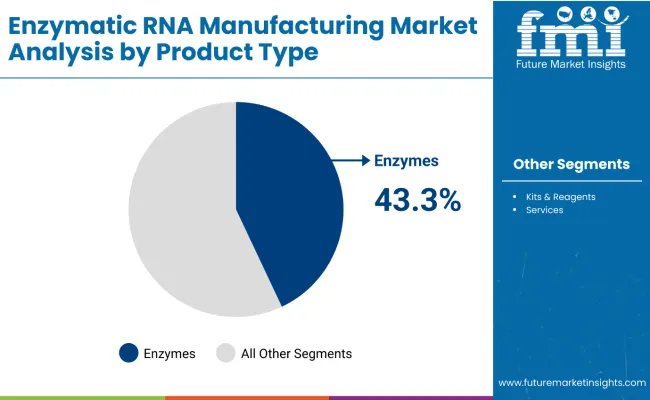
The enzymes segment is projected to account for 43.3% of the enzymatic RNA manufacturing market in 2025, slightly declining to 42.7% by 2035, maintaining its position as the leading product category. Pharmaceutical manufacturers and biotechnology companies increasingly utilize enzyme technology for their superior catalytic efficiency, precise synthesis control, and reliable performance in critical RNA manufacturing applications across diverse research and commercial settings. Enzyme technology's standardized performance and proven effectiveness directly address the production requirements for consistent RNA synthesis and reliable therapeutic molecule production in enzymatic manufacturing operations.
This product segment forms the foundation of modern RNA synthesis applications, as it represents the technology with the greatest catalytic potential and established compatibility across multiple synthesis platforms. Manufacturer investments in enzyme optimization and specificity enhancement continue to strengthen adoption among pharmaceutical producers. With biotechnology companies prioritizing synthesis efficiency and product quality, enzyme systems align with both manufacturing effectiveness objectives and regulatory compliance requirements, making them the central component of comprehensive RNA manufacturing strategies.
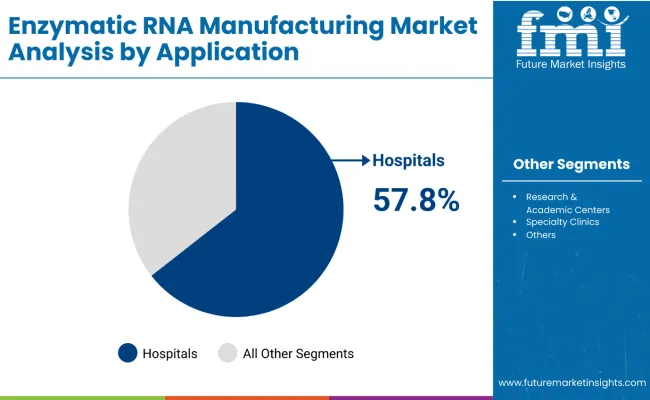
Hospital applications are projected to represent the largest share of enzymatic RNA manufacturing demand in 2025 at 57.8%, increasing to 58.2% by 2035, underscoring their critical role as the primary application for advanced RNA synthesis technologies in therapeutic development and clinical manufacturing protocols. Healthcare providers and pharmaceutical companies prefer hospital-based RNA manufacturing systems for their exceptional production capabilities, quality control features, and ability to support personalized medicine requirements while maintaining regulatory compliance during clinical and commercial phases. Positioned as essential platforms for RNA therapeutics and vaccine development, hospital applications offer both therapeutic innovation and clinical implementation advantages.
The segment is supported by continuous growth in RNA-based therapy adoption and the growing availability of advanced enzymatic technologies that enable enhanced therapeutic outcomes and patient care at the hospital level. Additionally, healthcare systems are investing in RNA manufacturing technologies to support therapeutic innovation and treatment personalization. As RNA therapeutics continue to evolve and providers seek superior synthesis solutions, hospital applications will continue to dominate the application landscape while supporting technology advancement and therapeutic excellence strategies.
Research & academic centers are projected to account for 20.1% of the market in 2025, increasing to 21.3% by 2035, reflecting their position as key drivers of RNA manufacturing innovation. This segment benefits from extensive research activities in RNA biology, therapeutic development, and educational programs requiring advanced synthesis capabilities. The growing emphasis on academic-industry partnerships and collaborative research supports continued growth in this application category.
Specialty clinics represent 14.3% in 2025, declining to 13.8% by 2035, driven by specialized therapeutic applications and niche treatment protocols. Others account for 7.8% in 2025, decreasing to 6.7% by 2035, reflecting stable but limited growth in emerging applications and specialized use cases.
The enzymatic RNA manufacturing market is advancing rapidly due to increasing RNA therapeutics development and growing demand for advanced synthesis technologies that emphasize superior product quality across pharmaceutical manufacturing and biotechnology applications. However, the market faces challenges, including high development costs compared to traditional synthesis methods, technical complexity in enzyme optimization, and competition from chemical synthesis alternatives. Innovation in enzyme engineering and process automation continues to influence market development and expansion patterns.
Expansion of RNA Therapeutics Development Programs
The growing adoption of enzymatic RNA manufacturing in comprehensive therapeutic development and commercial production applications is enabling pharmaceutical companies to develop processes that provide distinctive synthesis capabilities while commanding premium positioning and enhanced therapeutic effectiveness characteristics. Advanced enzymatic systems provide superior quality control while allowing more sophisticated RNA production across various therapeutic categories and manufacturing segments. Biotechnology companies are increasingly recognizing the competitive advantages of enzymatic synthesis positioning for comprehensive drug development and pharmaceutical market penetration.
Integration of Advanced Enzyme Engineering and Process Optimization
Modern enzymatic RNA manufacturing suppliers are incorporating advanced enzyme design systems, real-time monitoring technologies, and predictive optimization platforms to enhance synthesis efficiency, improve product quality, and meet pharmaceutical manufacturer demands for intelligent and reliable RNA production solutions. These programs improve manufacturing performance while enabling new applications, including personalized therapeutics and continuous production systems. Advanced technology integration also allows suppliers to support premium market positioning and synthesis excellence leadership beyond traditional RNA manufacturing products.
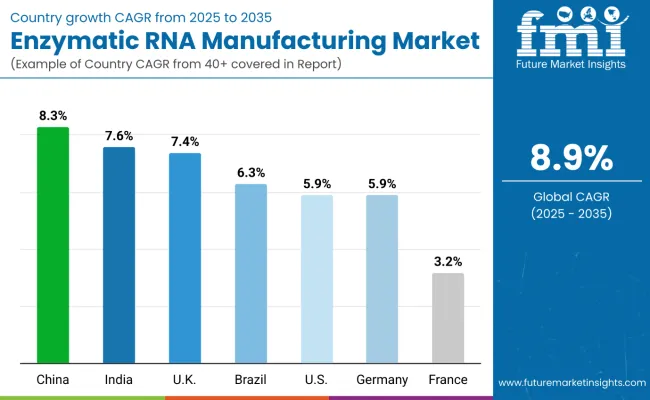
| Countries | CAGR (2025 to 2035) |
|---|---|
| China | 8.3% |
| India | 7.6% |
| UK | 7.4% |
| South Korea | 7.2% |
| Brazil | 6.3% |
| USA | 5.9% |
| Germany | 5.9% |
| France | 3.2% |
The enzymatic RNA manufacturing market is experiencing robust growth globally, with China leading at an 8.3% CAGR through 2035, driven by expanding biotechnology infrastructure, rising pharmaceutical investments, and increasing adoption of advanced RNA synthesis technologies. India follows at 7.6%, supported by growing healthcare innovation, expanding pharmaceutical research capabilities, and rising focus on therapeutic development. The UK shows growth at 7.4%, emphasizing biotechnology advancement and pharmaceutical research excellence.
South Korea demonstrates 7.2% growth, prioritizing advanced therapeutics development and biotechnology innovation. Brazil records 6.3%, focusing on healthcare modernization and pharmaceutical sector expansion. The USA demonstrates 5.9% growth, prioritizing advanced pharmaceutical innovation and comprehensive RNA synthesis solutions. Germany exhibits 5.9% growth, supported by precision biotechnology and manufacturing excellence. France shows 3.2% growth, supported by established pharmaceutical infrastructure and steady research advancement.
The report covers an in-depth analysis of 40+ countries; eight top-performing countries are highlighted below.
Revenue from enzymatic RNA manufacturing in China is projected to exhibit exceptional growth with a CAGR of 8.3% through 2035, driven by expanding biotechnology infrastructure and rising investments in pharmaceutical development across major research and manufacturing centers. The country's growing pharmaceutical market and increasing adoption of advanced RNA synthesis technologies are creating substantial demand for enzymatic RNA manufacturing solutions in both domestic and export-oriented applications. Major pharmaceutical manufacturers and biotechnology companies are establishing comprehensive production and research capabilities to serve both domestic healthcare needs and international pharmaceutical markets.
Rising biotechnology infrastructure development and expanding pharmaceutical investments are driving demand for enzymatic RNA manufacturing across pharmaceutical companies, biotechnology manufacturers, and research institutions throughout major Chinese biotechnology systems. Strong government support for pharmaceutical innovation and biotechnology advancement is supporting the rapid adoption of advanced RNA synthesis solutions among manufacturers seeking to meet evolving production standards and international quality expectations.
Revenue from enzymatic RNA manufacturing in India is expanding at a CAGR of 7.6%, supported by growing healthcare innovation initiatives, increasing pharmaceutical research capabilities, and expanding biotechnology development infrastructure with advanced synthesis capabilities. The country's developing pharmaceutical ecosystem and expanding research sector are driving demand for sophisticated enzymatic RNA manufacturing products across both academic research facilities and commercial development centers. International pharmaceutical companies and domestic biotechnology manufacturers are establishing comprehensive research and production capabilities to address growing market demand for advanced RNA synthesis solutions.
Rising healthcare innovation and expanding pharmaceutical research are creating opportunities for enzymatic RNA manufacturing adoption across pharmaceutical companies, research institutions, and biotechnology suppliers in major Indian pharmaceutical markets. Growing government focus on biotechnology advancement and pharmaceutical innovation is driving the adoption of premium RNA synthesis products among researchers and manufacturers seeking to upgrade to advanced therapeutic development technologies and research excellence standards.
Revenue from enzymatic RNA manufacturing in the UK is projected to grow at a CAGR of 7.4% through 2035, driven by biotechnology advancement initiatives, pharmaceutical research excellence, and established focus on therapeutic innovation requiring advanced synthesis solutions. The UK's established pharmaceutical infrastructure and increasing emphasis on RNA therapeutics development are creating substantial demand for both standard and premium enzymatic RNA manufacturing varieties. Leading pharmaceutical companies and biotechnology specialists are establishing comprehensive research strategies to serve both British markets and growing international pharmaceutical demand.
Rising biotechnology advancement and expanding pharmaceutical research focus are driving demand for premium enzymatic RNA manufacturing products across pharmaceutical companies, biotechnology manufacturers, and research providers seeking superior synthesis capabilities. Strong research expertise and pharmaceutical development initiatives are supporting the adoption of advanced RNA synthesis technologies among manufacturers prioritizing therapeutic excellence and innovation in pharmaceutical applications.
Revenue from enzymatic RNA manufacturing in South Korea is projected to grow at a CAGR of 7.2% through 2035, supported by advanced therapeutics development initiatives, biotechnology innovation leadership, and established focus on pharmaceutical advancement requiring sophisticated synthesis solutions. South Korean pharmaceutical manufacturers and biotechnology companies prioritize research excellence, technological innovation, and therapeutic advancement, making enzymatic RNA manufacturing essential technologies for both domestic development and export-oriented research. The country's comprehensive biotechnology ecosystem and innovation capabilities support continued market development.
Advanced therapeutics development capabilities and biotechnology innovation leadership are driving demand for specialized enzymatic RNA manufacturing products across pharmaceutical manufacturers, biotechnology companies, and research providers serving domestic and international markets. Strong focus on pharmaceutical innovation and technological advancement is encouraging manufacturers to adopt premium RNA synthesis products that support competitive positioning and meet South Korean quality standards for advanced therapeutic applications.
Revenue from enzymatic RNA manufacturing in Brazil is projected to grow at a CAGR of 6.3% through 2035, supported by healthcare modernization integration initiatives, pharmaceutical sector development, and established expertise in biotechnology applications. Brazilian healthcare providers' focus on therapeutic advancement, research development, and technological innovation creates steady demand for advanced RNA synthesis products. The country's attention to healthcare quality and pharmaceutical development drives consistent adoption across both commercial production and research applications.
Healthcare modernization integration and pharmaceutical sector development are driving steady demand for enzymatic RNA manufacturing products across pharmaceutical companies, biotechnology manufacturers, and research specialists seeking superior synthesis capabilities and therapeutic enhancement. Strong innovation culture and pharmaceutical development focus are supporting the adoption of premium RNA synthesis solutions among manufacturers seeking to meet Brazilian quality expectations and research standards for advanced therapeutic development.
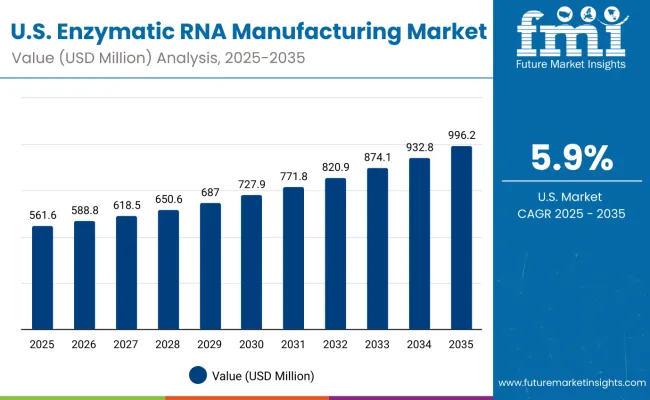
Revenue from enzymatic RNA manufacturing in the United States is projected to grow at a CAGR of 5.9% through 2035, supported by pharmaceutical innovation priorities, advanced biotechnology development sector, and established focus on therapeutic advancement and research optimization. American pharmaceutical manufacturers' emphasis on drug development, research efficiency, and technological leadership creates steady demand for advanced RNA synthesis products. The country's attention to pharmaceutical quality and innovation drives consistent adoption across both commercial manufacturing and research applications.
Pharmaceutical innovation priorities and advanced biotechnology development are driving steady demand for enzymatic RNA manufacturing products across pharmaceutical companies, biotechnology manufacturers, and research specialists seeking superior synthesis capabilities and innovation enhancement. Strong research culture and pharmaceutical development focus are supporting the adoption of validated RNA synthesis solutions among manufacturers seeking to meet American regulatory standards and innovation expectations for advanced therapeutic development.
Revenue from enzymatic RNA manufacturing in Germany is projected to grow at a CAGR of 5.9% through 2035, supported by precision biotechnology excellence sector, advanced research capabilities, and sustained reputation for producing high-quality pharmaceutical products while working to enhance RNA synthesis precision and develop advanced manufacturing technologies. Germany's pharmaceutical industry continues to benefit from its reputation for engineering excellence while focusing on biotechnology innovation and synthesis optimization.
Precision biotechnology excellence capabilities and advanced research expertise are driving the development of high-quality enzymatic RNA manufacturing products that command premium prices in international markets while supporting technological advancement and engineering excellence initiatives. Growing focus on pharmaceutical innovation and synthesis precision is supporting the adoption of advanced RNA manufacturing technologies among manufacturers seeking to ensure product quality and maintain German reputation for biotechnology excellence in therapeutic applications.
Revenue from enzymatic RNA manufacturing in France is projected to grow at a CAGR of 3.2% through 2035, supported by pharmaceutical research integration sector, established biotechnology capabilities, and sustained focus on therapeutic development while working to enhance synthesis technologies and develop advanced research platforms. France's pharmaceutical industry continues to benefit from its reputation for scientific excellence while focusing on research innovation and therapeutic advancement.
Pharmaceutical research integration capabilities and established biotechnology expertise are driving the development of specialized enzymatic RNA manufacturing products that support research excellence while advancing therapeutic development initiatives. Growing focus on pharmaceutical innovation and research integration is supporting the adoption of advanced RNA synthesis technologies among manufacturers seeking to ensure research quality and maintain French reputation for pharmaceutical research excellence in therapeutic applications.
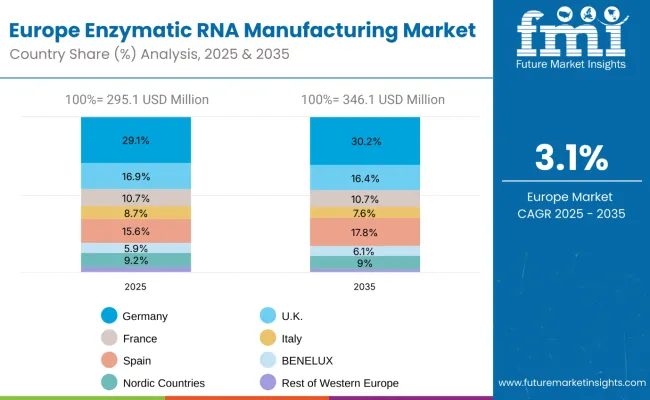
The enzymatic RNA manufacturing market in Europe is projected to grow at a CAGR of 4.9% from 2025 to 2035. Germany is expected to maintain its leadership position with a 29.1% market share in 2025, expanding to 30.2% by 2035, supported by its precision biotechnology sector, advanced pharmaceutical infrastructure, and research capabilities serving regional and international markets.
The United Kingdom follows with a 16.9% share in 2025, projected to reach 16.4% by 2035, driven by excellence in pharmaceutical research, biotechnology innovation, and therapeutic development. Spain holds a 15.6% share in 2025, expected to increase to 17.8% by 2035, supported by pharmaceutical sector growth and biotechnology advancement.
France accounts for 10.7% in 2025, projected to maintain 10.7% by 2035, while Nordic Countries contribute 9.2% in 2025, declining slightly to 9.0% by 2035. Italy represents 8.7% in 2025, decreasing to 7.6% in 2035, while BENELUX holds 5.9% in 2025, growing to 6.1% by 2035. The Rest of Western Europe region is expected to account for 4.0% in 2025, declining to 2.3% by 2035, reflecting mixed growth dynamics across smaller European markets.
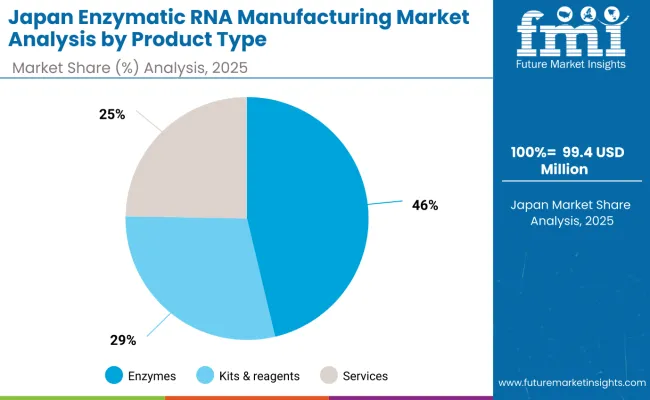
The enzymatic RNA manufacturing market in Japan is projected to grow steadily from 2025 to 2035, supported by advanced pharmaceutical infrastructure, strong biotechnology ecosystem, and adoption of innovative synthesis technologies.
Enzymes are expected to maintain their leadership position with a 46.3% market share in 2025, reflecting strong demand for advanced enzymatic solutions and synthesis optimization. Kits & reagents follow with 29.0% in 2025, supported by robust adoption of comprehensive reagent systems and standardized protocols.
Services hold 24.7% in 2025, leveraging Japan's expertise in technical support, process optimization, and quality assurance services for RNA synthesis applications.
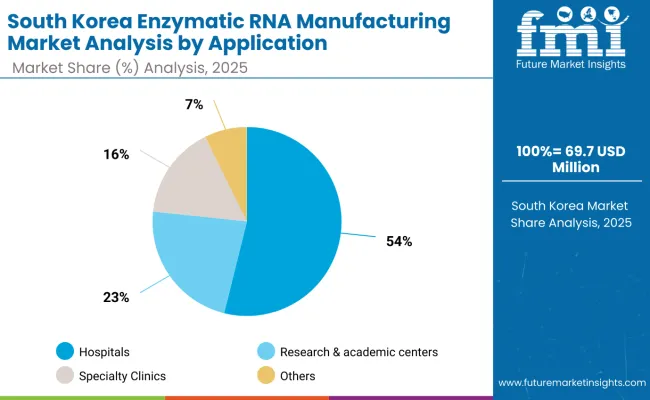
The enzymatic RNA manufacturing market in South Korea is projected to expand through 2035, driven by advanced healthcare infrastructure, strong pharmaceutical research capabilities, and increasing investment in RNA therapeutics development.
Hospitals are expected to maintain their leadership with a 53.9% market share in 2025, supported by growing implementation of RNA therapeutics, personalized medicine programs, and clinical manufacturing capabilities. Research & academic centers follow with 22.8% in 2025, reflecting South Korea's strong research infrastructure and educational excellence in biotechnology.
Specialty clinics account for 16.0% in 2025, supported by specialized therapeutic applications and niche treatment protocols. Others represent 7.3% in 2025, reflecting steady demand from emerging applications and specialized use cases.
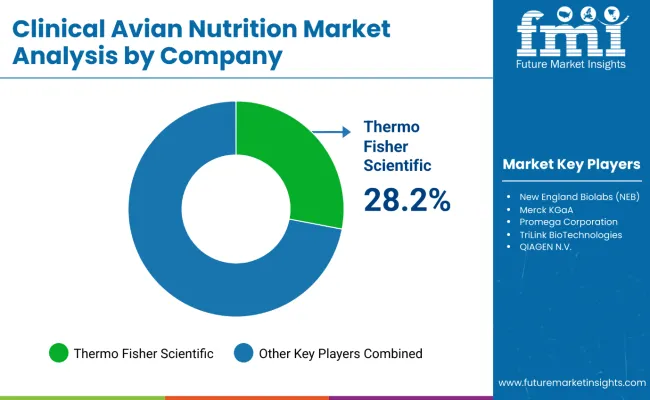
The enzymatic RNA manufacturing market is characterized by competition among established biotechnology companies, specialized enzyme suppliers, and integrated pharmaceutical solution providers. Companies are investing in advanced enzyme technologies, synthesis optimization systems, application-specific product development, and comprehensive technical support capabilities to deliver consistent, high-performance, and reliable enzymatic RNA manufacturing products. Innovation in enzyme engineering enhancement, process integration, and customized synthesis compatibility is central to strengthening market position and pharmaceutical manufacturer satisfaction.
Thermo Fisher Scientific leads the market with a dominant 28.2% share, focusing on comprehensive life sciences solutions and advanced biotechnology platforms, offering premium enzymatic RNA manufacturing products with emphasis on research excellence and synthesis optimization capabilities. Other key players provide specialized biotechnology and pharmaceutical manufacturing capabilities with focus on innovation and technical support. New England Biolabs delivers specialized enzyme solutions with emphasis on quality and research applications.
Merck KGaA specializes in pharmaceutical and biotechnology solutions with focus on manufacturing reliability and technical innovation. Promega Corporation focuses on life sciences research with emphasis on molecular biology tools and synthesis solutions. TriLinkBioTechnologies emphasizes nucleic acid synthesis with focus on custom RNA manufacturing and therapeutic applications. QIAGEN N.V. provides molecular diagnostics and research solutions with emphasis on sample preparation and analysis technologies.
The global enzymatic RNA manufacturing market represents a rapidly expanding $1.36 billion opportunity in 2025, projected to reach $3.18 billion by 2035 at an 8.9% CAGR. Enzymatic RNA manufacturing offers superior synthesis precision, consistent product quality, and scalable production capabilities essential for RNA therapeutics, mRNA vaccines, gene therapy, and personalized medicine applications. Success requires coordinated action across regulatory bodies, technology innovators, pharmaceutical manufacturers, research institutions, and capital providers to unlock the full potential of this transformative biotechnology sector.
Regulatory Framework Enhancement:
Research & Development Investment:
Infrastructure & Manufacturing Support:
Strategic Stockpiling & Preparedness:
Standardization & Quality Assurance:
Market Development & Education:
Collaborative Platforms:
Innovation Acceleration:
Advanced Synthesis Platforms:
Enzyme Engineering & Optimization:
Integrated Digital Solutions:
Quality Control & Analytics:
Technology Integration Strategies:
Product Development Acceleration:
Supply Chain Optimization:
Regulatory Strategy Development:
Platform Technology Investment:
Manufacturing Infrastructure Development:
Innovation & IP Development:
Market Expansion Strategies:
Strategic Consolidation Opportunities:
| Items | Values |
|---|---|
| Quantitative Units (2025) | USD 1,357.4 million |
| Product Type | Enzymes, Kits & Reagents, Services |
| Application | Hospitals, Research & Academic Centers, Specialty Clinics, Others |
| Regions Covered | North America, Europe, East Asia, South Asia & Pacific, Latin America, Middle East & Africa |
| Countries Covered | United States, Germany, United Kingdom, France, China, Japan, South Korea, India, Brazil, and 40+ countries |
| Key Companies Profiled | Thermo Fisher Scientific, New England Biolabs, Merck KGaA, Promega Corporation, TriLink BioTechnologies, QIAGEN N.V. |
| Additional Attributes | Dollar sales by product type and application, regional demand trends, competitive landscape, technological advancements in enzymatic synthesis, pharmaceutical integration initiatives, therapeutic development programs, and synthesis excellence enhancement strategies |
By North America
By Europe
By East Asia
By South Asia & Pacific
By Latin America
By Middle East & Africa
The global enzymatic RNA manufacturing market is valued at USD 1,357.4 million in 2025.
The size for the enzymatic RNA manufacturing market is projected to reach USD 3,184.1 million by 2035.
The enzymatic RNA manufacturing market is expected to grow at an 8.9% CAGR between 2025 and 2035.
The key product type segments in the enzymatic RNA manufacturing market are enzymes, kits & reagents, and services.
In terms of application, hospitals segment is set to command 57.8% share in the enzymatic RNA manufacturing market in 2025.






Our Research Products

The "Full Research Suite" delivers actionable market intel, deep dives on markets or technologies, so clients act faster, cut risk, and unlock growth.

The Leaderboard benchmarks and ranks top vendors, classifying them as Established Leaders, Leading Challengers, or Disruptors & Challengers.

Locates where complements amplify value and substitutes erode it, forecasting net impact by horizon

We deliver granular, decision-grade intel: market sizing, 5-year forecasts, pricing, adoption, usage, revenue, and operational KPIs—plus competitor tracking, regulation, and value chains—across 60 countries broadly.

Spot the shifts before they hit your P&L. We track inflection points, adoption curves, pricing moves, and ecosystem plays to show where demand is heading, why it is changing, and what to do next across high-growth markets and disruptive tech

Real-time reads of user behavior. We track shifting priorities, perceptions of today’s and next-gen services, and provider experience, then pace how fast tech moves from trial to adoption, blending buyer, consumer, and channel inputs with social signals (#WhySwitch, #UX).

Partner with our analyst team to build a custom report designed around your business priorities. From analysing market trends to assessing competitors or crafting bespoke datasets, we tailor insights to your needs.
Supplier Intelligence
Discovery & Profiling
Capacity & Footprint
Performance & Risk
Compliance & Governance
Commercial Readiness
Who Supplies Whom
Scorecards & Shortlists
Playbooks & Docs
Category Intelligence
Definition & Scope
Demand & Use Cases
Cost Drivers
Market Structure
Supply Chain Map
Trade & Policy
Operating Norms
Deliverables
Buyer Intelligence
Account Basics
Spend & Scope
Procurement Model
Vendor Requirements
Terms & Policies
Entry Strategy
Pain Points & Triggers
Outputs
Pricing Analysis
Benchmarks
Trends
Should-Cost
Indexation
Landed Cost
Commercial Terms
Deliverables
Brand Analysis
Positioning & Value Prop
Share & Presence
Customer Evidence
Go-to-Market
Digital & Reputation
Compliance & Trust
KPIs & Gaps
Outputs
Full Research Suite comprises of:
Market outlook & trends analysis
Interviews & case studies
Strategic recommendations
Vendor profiles & capabilities analysis
5-year forecasts
8 regions and 60+ country-level data splits
Market segment data splits
12 months of continuous data updates
DELIVERED AS:
PDF EXCEL ONLINE
Enzymatic DNA Synthesis Market Size and Share Forecast Outlook 2025 to 2035
Enzymatic Acrylamide-Reduction Systems Market Analysis - Size, Share, and Forecast Outlook 2025 to 2035
Enzymatic Cleaning Market – Demand, Innovations & Forecast 2025 to 2035
Enzymatically Interesterified Oils Market
Enzymatically Hydrolyzed Carboxymethyl Cellulose Market
Soybean Enzymatic Protein Market Size and Share Forecast Outlook 2025 to 2035
RNA-Targeted Small Molecules Market – Trends & Forecast 2024-2034
RNA Isolation and Enrichment Reagent Market
mRNA Sequencing Market - Growth & Forecast 2025 to 2035
Furnace Wall Sootblower Market Size and Share Forecast Outlook 2025 to 2035
Furnace Market Size and Share Forecast Outlook 2025 to 2035
Vernal Keratoconjunctivitis Market Size and Share Forecast Outlook 2025 to 2035
Carnauba Wax Market Analysis - Size, Share, and Forecast Outlook 2025 to 2035
Internal Anthelmintics for Cats Market Size and Share Forecast Outlook 2025 to 2035
External Anthelmintic for Dogs Market Size and Share Forecast Outlook 2025 to 2035
Returnable Packaging Market Size and Share Forecast Outlook 2025 to 2035
External Storage Market Size and Share Forecast Outlook 2025 to 2035
External Fixator Market Size and Share Forecast Outlook 2025 to 2035
Alternative Lending Platform Market Size and Share Forecast Outlook 2025 to 2035
External Anti-infective Preparations Market Size and Share Forecast Outlook 2025 to 2035

Thank you!
You will receive an email from our Business Development Manager. Please be sure to check your SPAM/JUNK folder too.
Chat With
MaRIA